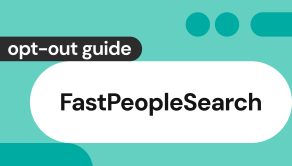How to remove your phone number from the Internet
 Erin Kapczynski
SVP, B2B Marketing at Onerep
Erin Kapczynski
SVP, B2B Marketing at Onerep

Few personal details are as impactful as our phone numbers. Not only are they a gateway to digital products and services, but they pose a serious privacy risk when they fall into the wrong hands.
- Remove your phone number from Google and people-search sites
- Contact the site owners directly
- Remove your phone number from Facebook
- Remove your phone number from Twitter
- Remove your phone number from Instagram
- Register your number on the National Do Not Call Registry
- Tighten your apps permissions
- Don’t give out your number
You grab your phone and try to check your Instagram, only to discover that you’ve been logged out and are no longer connected to your username. Weird, but not the end of the world, right?
The next day, you discover you’re locked out of your email accounts, too. Moments later, your phone stops working altogether. When you contact your cell phone provider, you’re told that your phone number has been assigned to a new phone. Your day just keeps getting worse, and you’re not even sure what’s happening.
If your phone number is exposed on the internet, this nightmarish experience, known as SIM swapping, could happen to you. And that’s just one of the threats to your privacy and safety associated with your phone number displayed online. Fortunately, there are steps you can take to protect your phone number and identity. Keep reading to learn more about the dangers of keeping your number on the internet and how you can mitigate those risks.
What can my phone number reveal about me?
Did you know that your phone number is just as sensitive as your social security number? Just think about all the accounts linked to those 10 digits: personal and work email, social media, online shopping, banks, utilities, and more.
Once a hacker gets their hands on your number, it doesn’t take much work for them to access your personal information including:
- Your current and former addresses
- Your family members’ names and addresses
- Mortgage and property tax details if you own your home
- Your legal history including traffic and criminal records
- Your net worth, income, and credit score range
Read on to learn how bad actors can get their hands on this sensitive information. And first, let’s dive into the risks you face when your phone number is exposed online.
What can someone do with my phone number?
Once a hacker gets a hold of your phone number, you can become the victim of a variety of security threats ranging from inconvenient to downright dangerous. Take a look at the following activities bad actors can get away with once they have your phone number:
- Subject you to relentless robocalls. There’s a good chance that you’ve received at least one (or 100) of the nearly 4 billion robocalls that take place each month in the U.S. As long as your phone number is on the internet, telemarketers and scammers will have no trouble at all finding it and harassing you with weekly, daily, and sometimes hourly phone calls. These phone calls are more than frustrating inconveniences. Since many robocalls are actually illegal scams, answering them makes you vulnerable to identity and financial theft.
- Find out your personal details to steal your identity, impersonate you, hijack your accounts, and involve you into fraudulent schemes. Unless you take proactive steps to protect your information, a simple Google search can lead bad actors to numerous people-search sites such as Spokeo, MyLife, FastPeopleSearch, and others. Hackers can easily obtain private details about you from these data brokers including your phone number, and use that information to steal your identity. Even FTC Chief Technologist Lorrie Cranor faced identity theft when someone claiming to be her used her number to disable her phone and get two new phones for themselves.
- Discover where you live and threaten you physically. Your phone number can lead someone to your name, address, and the names and addresses of immediate family members. Again, data brokers and people-search sites are to blame. To attract visitors, so many of them share this information on their websites without hiding it behind the paywall. Even more unsettling, all a stalker needs to track your location, monitor your text messages, and even listen in on your phone calls is your phone number. If there is anyone in your life who wishes you harm, this is an obvious safety threat. Because your phone number can also be used to identify details about your home including its square footage and property taxes, it can make your home a target of burglary as well.
- Spoof call your friends, relatives, colleagues and business partners. Phone scammers have found a way to make your number appear on someone else’s caller ID even if you’re not the one making the call. Known as spoofing, this scamming technique lures unsuspecting friends, family members, and business associates into answering phone calls and potentially divulging personal information that could lead to identity theft. If your grandmother saw your number appear on her caller ID, wouldn’t she answer the phone? If she isn’t aware of spoofing scams, she might readily give away credit card information thinking that somehow it will help you.
- Complete a SIM swap (port-out scam). If Twitter CEO Jack Dorsey can become a victim of SIM swapping, you’re vulnerable to this type of cyber attack, too. With just your phone number, hackers can trick cell phone providers into switching your number to a SIM card that they control. This gives hackers access to all of the data stored on your phone: your contacts, social media accounts, bank accounts, emails, cryptocurrency, and more. Unfortunately, a 2020 Princeton study found that even the largest, most popular cell phone providers lack adequate protections against SIM swaps.
How does my phone number end up online?
There are several ways that your phone number can get on the internet, including the following:
- You willingly share your phone number. Inserting your phone number is often required when registering for a social media or online shopping account. You may even have written your number in a public social media post, unaware of the threat this posed.
- Phone applications distribute your number. Many of the apps that you use collect and distribute your data – including your phone number – to third-party sources unless you explicitly disable those permissions.
- You’re the victim of a data breach. Unfortunately, an enormous percentage of Americans have had their data exposed to bad actors and they don’t even know it. In 2020, there were a total of 1001 recorded cases of data breaches, each breach affecting many times that number of people. Over 155.8 million individuals were victims of data exposures in 2020.
- Data brokers found you. People-search sites scrape private information including phone numbers from the internet, making it visible to search engines and, as a result, to anyone who wants it.
How to check if my phone number is exposed?
The easiest way to figure out where your phone number is listed is to do what the hackers do: check Google.
Simply type in the information below to see what comes up:
- Your full name and number
- Your phone number in the following formats (the provided area code is just an example – use your own when you search this information):
(218) xxx-xxxx
218xxxxxxx
+1218xxxxxxx - Your business name and phone number
- Your name and work number
Sounds like a lot of work? You can also use a free Onerep search feature to scan 231 people-search sites for your personal information including your phone number.
How do I take my phone number off the Internet?
Learning about the risks of having your phone number on the internet can be overwhelming, but there are steps you can take to regain control of your privacy. Follow these tips to remove your phone number from the internet:
#1 Remove your phone number from Google and people-search sites
To remove your phone number from Google, you need to delete your listings from people-search sites. These are the main suppliers of your personal information for Google search results.
Data brokers and people-finder websites are legally required to provide a way for you to opt out, but they don’t make it easy. You’ll have to go to every people-search website where your number appears and look for the opt-out option. Some data brokers require you to call, email, and send additional information to initiate the opt-out. Make sure you sit down to do the hard work of deleting your info from these sites when you have a lot of time and patience to give. At Onerep, we developed 350+ DIY opt-out instructions to guide you through this complicated and time-consuming process.
If you don’t feel like spending your time on manual opt-outs, Onerep has automated this process for your convenience. Already during a five-day free trial, our automatic removal platform will scan the internet to find the sites that expose your information, display the results on your personal dashboard, and will start removing your listings by sending opt-out requests on your behalf.
#2 Contact the site owners that share your phone number directly
If your number is listed on a third-party website that doesn’t have a visible pathway to opt out, you can try to reach out to the site owner directly. Although they may not be willing to remove your number, make the ask anyway. Your privacy is worth it.
#3 Remove your phone number from Facebook
You can remove your number from Facebook by following the guidelines listed here.
#4 Remove your phone number from Twitter
Follow these instructions to remove your phone number from Twitter.
#5 Remove your phone number from Instagram
You can remove your number from Instagram by taking the following steps:
- Open your Instagram app on your phone.
- Log in to your account.
- Click on the profile icon on the bottom right of your navigation menu.
- Select “Edit Profile.”
- Click on “Personal Information Settings.”
- Delete the phone number listed.
Once you remove your phone number from Instagram, you won’t be able to log in with just your phone (you can still do it via your account name and email address) or find friends using your phone contacts – but that means hackers won’t be able to do that either.
#6 Register your number on the National Do Not Call Registry
A staggering one-in-10 Americans are scammed by robocalls every year, costing a cumulative $9.5 billion. You can reduce the likelihood of becoming a victim by listing your number on the National Do Not Call Registry. While registering will not stop all robocalls, it will prevent legitimate companies from making unwanted sales calls to your number.
#7 Tighten your app permissions
People often download apps and agree to terms they haven’t read. While the terms and conditions don’t make much for entertaining reading, it’s still important to go through them to make sure you aren’t authorizing your apps to distribute personal information such as your phone number.
#8 Don’t give out your number
The most effective way to keep your number private? Don’t give it out in the first place. Many people believe that signing up for do-not-call lists or getting an unlisted number puts maddening robocalls and security threats to an end, but unfortunately, that’s not the reality.
Once your number is out there, you’re likely to be called at least periodically. Furthermore, scammers and less scrupulous businesses ignore do-not-call lists. Your best protection from bad actors is to treat your phone number like it’s your social security number. If you need to have a public number, use a service such as Google Voice to ensure that you can keep your phone number off the internet and control who can reach you.
Final advice
As long as your phone number is on the internet, you’re exposed to serious risks. The good news is that by following the suggestions listed above, you can retake the wheel and drive yourself into a more secure future. Removing your phone number from the internet is a big step towards your privacy, and Onerep is here to help you regain it.
FAQs
How to remove my mobile number from all websites?
Start by searching for your phone number on Google to find the websites that expose it. Then, follow opt-out procedures or contact the sites directly and ask to have your number removed. After that, go through your social media, blogs, and forum profiles to check if you have revealed the number in your posts or bio. It’s also a good idea to create a secondary phone number that you will use to subscribe to non-essential services to keep your primary one private.
How to remove my phone number from Google?
To remove your phone number from Google, you need to remove it from sites that publish it. For that, contact website admins directly or follow opt-out procedures if they are in place. If a site doesn’t honor your request, you can use Google’s tools to remove the webpage that exposes your number from search results (but it will remain published on that site). Use Google’s personal content removal form and outdated content refresh tool.
How to unlist my phone number from people-search sites?
First, you need to identify all people-search websites that share your phone number. For that, Google yourself or run a free scan of 200+ sites on Onerep. Then, tackle each website individually–find opt-out links or “Do not sell my info” pages. You’ll need to check back after requesting removal to make sure that your profile is really gone. People-search sites also tend to update their databases and republish records, so you must continuously monitor them to keep your data off.
Sources
- https://www.nytimes.com/2019/08/15/technology/personaltech/i-shared-my-phone-number-i-learned-i-shouldnt-have.html
- https://www.nytimes.com/2019/09/05/technology/sim-swap-jack-dorsey-hack.html
- https://techcrunch.com/2018/12/25/cybersecurity-101-guide-protect-phone-number
- https://www.donotcall.gov/register.html
- https://www.fcc.gov/spoofed-robocalls
- https://www.fcc.gov/consumers/guides/cell-phone-fraud
- https://www.statista.com/statistics/273550/data-breaches-recorded-in-the-united-states-by-number-of-breaches-and-records-exposed
- https://help.twitter.com/en/managing-your-account/how-to-update-your-account-phone-number
- https://help.twitter.com/en/managing-your-account/how-to-update-your-account-phone-number
- https://www.facebook.com/help/124895950923762
 Erin Kapczynski
SVP, B2B Marketing at Onerep
Erin Kapczynski
SVP, B2B Marketing at Onerep



